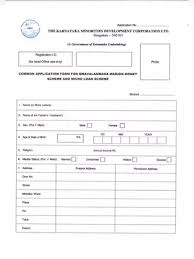You can download the Swavalambana MM Scheme Micro Loan Scheme Form Karnataka PDF for free by using the direct link provided below on the page.
Swavalambana MM Scheme & Micro Loan Scheme Form Karnataka PDF
In this incredible scheme, individuals belonging to religious minority communities have the opportunity to receive financial assistance to kickstart and enhance their businesses, small-scale cottage industries, service sector ventures, agriculture-based activities, and more. This assistance is made possible through collaboration with banks, financial institutions, and cooperative societies. To make dreams a reality, loans are provided through various nationalized banks, financial institutions, and cooperative societies.
The maximum project cost eligible for this scheme is up to ₹5,00,000. Here’s how the loan structure works: the corporation sanctions 20% of the project cost as a Margin Money loan at an interest rate of 6% per annum. Additionally, a subsidy of 5% of the unit cost or a maximum of ₹25,000 is provided. The remaining balance is then provided as a loan by the banks, financial institutions, or cooperative societies.
The repayment process. The Margin Money loan sanctioned by the corporation must be repaid by the beneficiary in either 36 or 60 monthly installments, depending on the agreed terms. The interest rate for this repayment is set at 6% per annum, ensuring a fair and manageable repayment plan for the beneficiaries. It’s important to highlight that this scheme is not only implemented through banks and financial institutions but also through cooperative societies.
These cooperative societies, registered under the Co-operative Societies Act 1959, play a crucial role in the upliftment of minority communities. They work tirelessly to support and empower their members, showing profitability and possessing the necessary financial resources to grant loans.
By implementing this scheme through cooperative societies, it ensures that the benefits reach the grassroots level and directly impact the lives of individuals within religious minority communities. This approach fosters community development, self-sufficiency, and economic growth. The ultimate goal of this scheme is to provide equal opportunities and empower individuals from religious minority communities to become successful entrepreneurs and contributors to the economy. It goes beyond financial assistance, as it also aims to create a supportive ecosystem that nurtures and guides these individuals throughout their entrepreneurial journey.
Through this scheme, not only are businesses and industries being established, but it also leads to job creation, skill development, and overall economic progress. The impact is far-reaching, benefiting not only the individuals involved but also the larger community and society as a whole. This scheme is a powerful initiative that aims to uplift and empower individuals from religious minority communities. By providing financial assistance, access to loans, and a supportive ecosystem, it paves the way for entrepreneurship, economic growth, and a brighter future. It’s a testament to the government’s commitment to fostering inclusivity, equal opportunities, and sustainable development.
Required Documents for Swavalambana MM Scheme & Micro Loan Scheme
To avail the facilities of this scheme, societies interested in participating need to submit the following documents:
- 1. Registration Certificate of the Society: This document proves the society’s legal existence and registration under the appropriate governing body.
- 2. Bye-Laws of the Society: These are the rules and regulations that govern the society’s operations, structure, and activities.
- 3. Details of provisions made to get money from the State Govt: This includes information about the society’s plans and arrangements to secure funds from the state government for their initiatives.
- 4. Audited Report for the last 3 years: This report provides a comprehensive overview of the society’s financial transactions, income, and expenses, ensuring transparency and accountability.
- 5. Report of the Dy. registrar of Co-Operative Societies with no adverse remarks: This report, issued by the Deputy Registrar of Co-operative Societies, confirms that the society has no negative remarks or issues that could hinder their participation in the scheme.
- 6. Contract deed and Guarantee letter: These documents outline the terms and conditions of any contracts or agreements entered into by the society, as well as any guarantees provided by third parties.
- The modified scheme introduced by the Government of Karnataka through G.O.No.MWD/60/MDC/2016 dt.27.10.2016. They have transformed the ‘Swavalambana’ Margin Money Loan and Subsidy Scheme into the Self-employment Scheme.
- Under this modified scheme, subsidies will be granted to applicants belonging to religious minority communities who wish to start or improve their businesses, small-scale cottage industries, service sector ventures, and agriculture-based activities. This collaboration is done in coordination with Nationalized Banks. Here are the details of the benefits:
- For economic activities with a unit cost of up to Rs.1.00 Lakh, a subsidy of 50% or a maximum of Rs.35,000/- will be sanctioned.
- For economic activities with a unit cost of Rs.1.00 Lakh and above, a subsidy of 33% or a maximum of Rs.2.00 Lakhs will be sanctioned.

